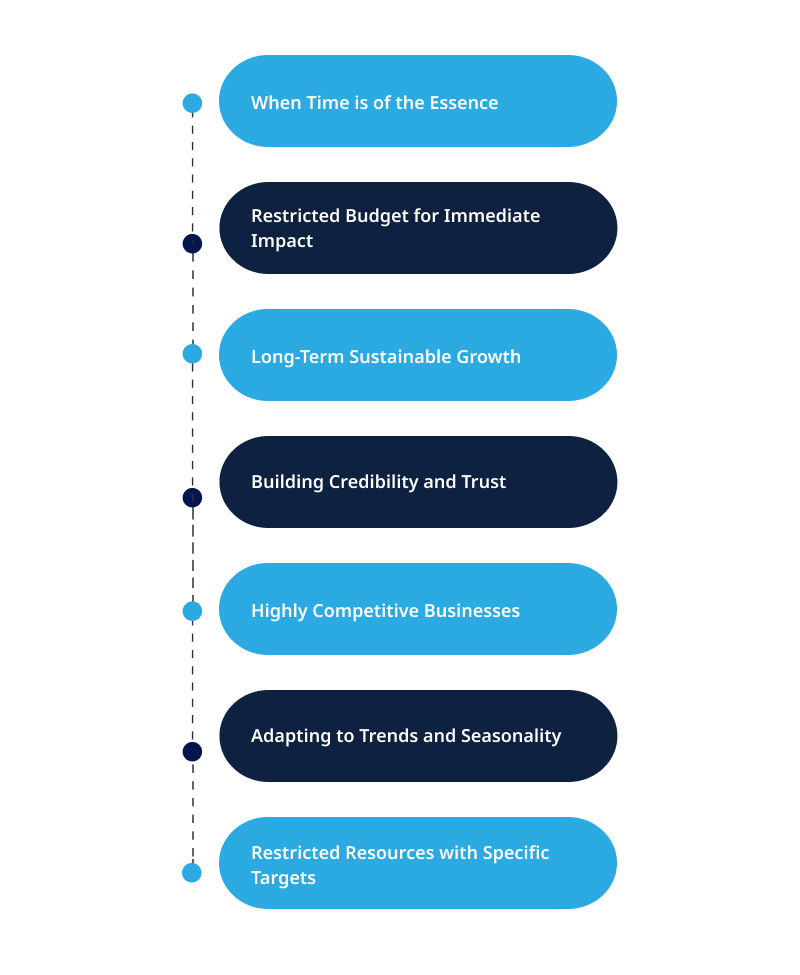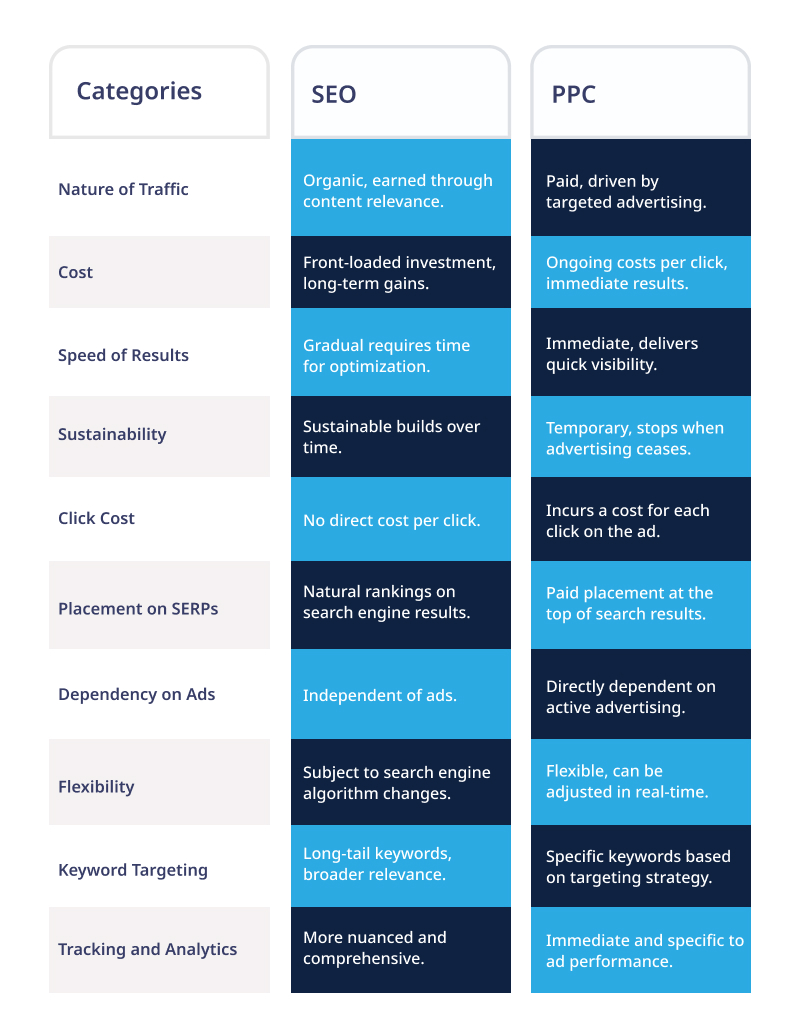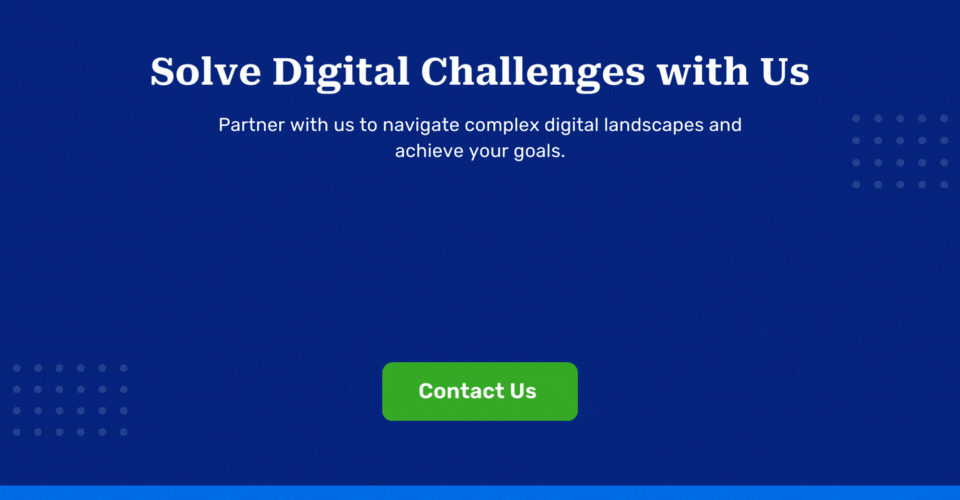Paid-per-click (PPC) advertising and search engine optimization (SEO) are the primary methods for boosting your online presence.
Regarding SEO vs PPC, the choice depends on your goals, budget, and target audience.
This blog will break down SEO and PPC strategies into their component elements. And list how situations in which utilizing them will enhance your marketing plan.
Table of Contents
Why do businesses get confused when choosing between SEO and PPC?
Businesses often grapple with the choice between SEO and PPC due to the diverse and sometimes conflicting nature of these digital marketing strategies. The confusion stems from several factors, each presenting its considerations.
- When one considers that PPC requires recurring payments for ad placements and SEO demands a large upfront investment in content generation and optimization, resource allocation becomes problematic.
- Time sensitivity further complicates the decision-making process; companies looking for quick wins choose PPC, while those concentrating on long-term organic growth might choose SEO’s delayed effects.
- Budgetary considerations are quite important as PPC advertising can be more expensive in the near run.
- The conflict between credibility and visibility increases complexity. While organic SEO results foster trust, PPC offers instant visibility through sponsored advertisements.
- Algorithm changes and the need for adaptability in SEO, coupled with PPC’s more immediate and measurable ROI, contribute to the confusion.
Ultimately, the alignment of marketing goals with the strengths and limitations of each approach adds another layer to the decision-making challenge.
When to Choose PPC and SEO?
Balancing the dynamic landscape of digital marketing involves strategic decisions on when to leverage PPC (Pay-Per-Click) or invest in SEO (Search Engine Optimization). Knowing which situations work best for each method is essential to making the most out of your marketing campaigns.
- When Time is of the Essence: Select pay-per-click (PPC) advertising when you need to get rapid visibility and traffic for time-sensitive campaigns or promotions.
- Restricted Budget for Immediate Impact: If your budget is tight but needs to make an impact immediately, go for PPC because it allows you to manage spending and target particular demographics.
- Long-Term Sustainable Growth: Use SEO to establish your company as an authority in your sector and gradually increase organic visibility. This will lead to long-term, sustainable growth.
- Building Credibility and Trust: SEO is the best option for establishing credibility and trust as customers view organic search results as more trustworthy.
- Highly Competitive Businesses: Pay-per-click (PPC) advertising offers a prompt means of securing a prominent position on search engine results pages in highly competitive businesses where organic rankings are hotly disputed.
- Adapting to Trends and Seasonality: PPC is perfect for companies who must swiftly modify their messaging or target different market segments because it can be adjusted to changing trends and seasonality.
- Restricted Resources with Specific Targets: PPC offers fine-grained control over ad spending and audience demographics when resources are scarce, but exact audience targeting is essential.
Take your website traffic to new heights with our SEO and PPC expertise. Discuss with us the most suitable choice for your business.
Why Should You Track Organic and Paid Search Keywords?
Keeping a close eye on sponsored and organic search terms is essential to fully comprehending your online presence and marketing tactics. Here’s why:
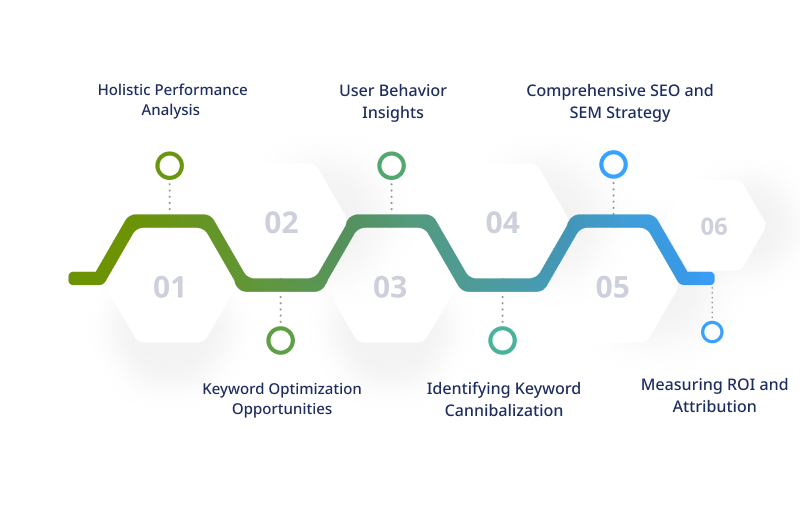
You can see your digital strategy from an integrated perspective by examining keyword success on these two platforms.
A more thorough grasp of user behavior, preferences, and the general efficacy of your search engine marketing initiatives is made possible by this integrated strategy.
Finding synergies, overlaps, and improvement opportunities facilitates better decision-making and a more unified online approach.
Keyword Optimization Opportunities: Keeping an eye on sponsored and organic search terms can give you important insights into the words and phrases that appeal to your target market.
You can improve your content and ad campaigns by finding high-performing keywords. Using a data-driven approach, you may optimize the effectiveness of paid advertising and enhance organic search ranks by optimizing your keyword strategy.
A more unified and effective digital marketing plan may be created by coordinating your keyword optimization efforts across all platforms, which can improve outcomes and fortify your online presence.
User Behavior Insights: Monitoring search terms from both sponsored and organic sources yields insightful data about user activity. Businesses can learn what people look for when they find their website organically by examining the terms that generate organic traffic.
However, tracking keywords used in paid searches shows which terms drive visitors to click on sponsored advertisements. By combining this information, marketing campaigns may be more effectively tailored to the user’s intent, content strategies can be improved, and user experience can be improved.
Identifying Keyword Cannibalization: Keyword cannibalization occurs when multiple pages on a website target the same or very similar keywords. By monitoring terms from sponsored and organic searches, companies can spot cases of keyword squaring.
This duplication may cause search engines to become confused, which could affect how pages rank and lessen a campaign’s overall impact.
Businesses may enhance their content strategy, boost page ranks, and guarantee a more streamlined and effective method of targeting particular search terms by keeping an eye out for and responding to keyword cannibalization.
Comprehensive SEO and SEM Strategy: Developing a comprehensive plan for Search Engine Marketing (SEM) and Search Engine Optimization (SEO) requires tracking sponsored and organic search terms.
Organic keywords improve a website’s content optimization and overall SEO by making the site more visible in search results. Paid search terms also provide information to PPC (Pay-Per-Click) campaigns, allowing audience-specific advertising tailored to their search queries.
Businesses can ensure a more efficient and coordinated approach to search engine exposure by cohesively aligning their online presence with insights from organic and paid searches.
Measuring ROI and Attribution: Keeping an eye on sponsored and organic search terms yields useful information for attribution analysis and Return on Investment (ROI) calculations across marketing channels.
Understanding the long-term effects of SEO work is aided by the organic traffic that eventually converts due to the contribution of organic keywords.
However, paid search terms are integrated directly into PPC campaigns, making it possible to measure ad performance precisely and evaluate ROI immediately.
Businesses are given a thorough understanding of how each channel contributes to conversions by examining the interaction between organic and sponsored results.
Choosing between SEO and PPC can be daunting. We can help you enhance your website’s online presence organically and with paid traffic.
SEO and PPC: How Can They Work Together?
The combination of SEO and PPC strategy can be effective in the ever-changing world of digital marketing.
By strategically aligning these two techniques, firms may leverage their distinct advantages to optimize their online presence and generate outcomes. Here’s how:
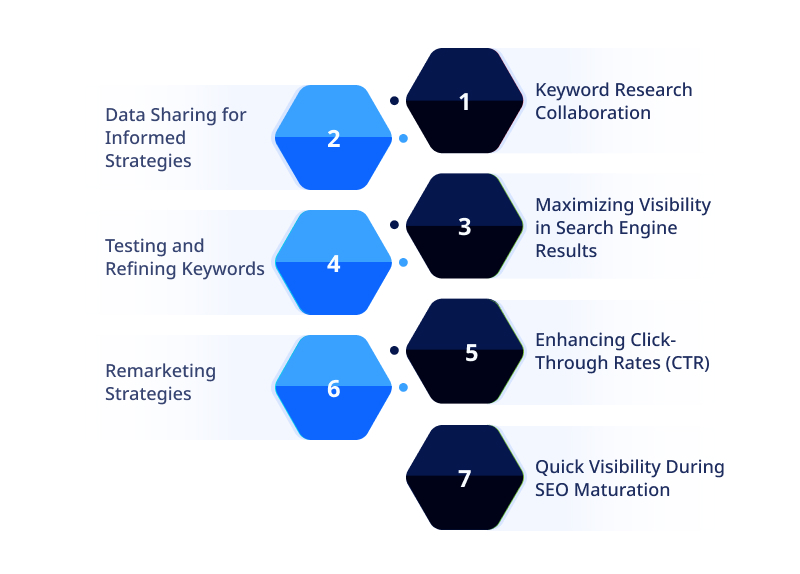
PPC campaigns can offer insightful real-time data on a keyword’s efficacy, making SEO teams aware of trends and opportunities.
On the other hand, SEO teams can identify long-term keyword strategies that PPC might miss at first, adding to an all-encompassing and cohesive strategy.
Data Sharing for Informed Strategies: The efficacy of a campaign is increased when SEO and PPC management teams exchange data seamlessly. Both teams learn greatly from sharing information about user behavior, conversion rates, and performance indicators.
For example, PPC conversion data can help SEO teams by revealing the most successful landing pages, which will help with on-page optimization.
On the other hand, PPC teams can improve their targeting and messaging by using data from SEO that is created about organic traffic and user engagement.
By combining SEO and PPC strategies, this cooperative data-driven approach guarantees a more comprehensive and educated digital marketing strategy that maximizes its effects.
Maximizing Visibility in Search Engine Results: PPC and SEO strategy can improve a website’s overall exposure on search engine results pages (SERPs).
While PPC offers instant awareness through sponsored advertisements, SEO concentrates on achieving organic results through link building and content optimization.
Through concerted efforts, businesses can take over the search engine results page (SERP) and hold sponsored and organic positions. It will increase the probability of user engagement and click-throughs.
Using an integrated approach, the brand’s visibility across different search result areas is reinforced, increasing the possibilities of reaching a wider audience.
Testing and Refining Keywords: SEO and PPC can collaborate well regarding keyword planning. PPC advertising offers a useful platform for finding conversion-boosting keywords with strong performance.
The keywords chosen for SEO optimization can be informed and improved by the information and understandings obtained from PPC campaigns, such as click-through rates and conversion metrics.
By working together, we can ensure that the organic content is intelligently matched with phrases shown to drive paid traffic effectively. Companies can attain a more thorough and optimized online presence by using organic vs paid search with keyword research.
Enhancing Click-Through Rates (CTR): SEO and PPC strategies can improve click-through rates by carefully matching sponsored and organic search results.
Brand visibility increases and the brand’s position on the search engine results page (SERP) is strengthened when chosen keywords are combined with organic listings and paid advertisements.
Furthermore, PPC ad content testing can offer perceptions into persuasive language that can be utilized for SEO title tags and meta descriptions, enhancing organic click-through rate.
Remarketing Strategies: Coordinated remarketing campaigns use SEO and PPC’s advantages to reconnect with website visitors. Businesses may stay top-of-mind and encourage repeat visits by employing PPC advertisements to target certain audience segments interacting with the website.
In addition, by optimizing landing pages for pertinent keywords, SEO can help remarketing campaigns by guaranteeing that customers who find the site through organic search get a smooth and engaging user experience.
By working together, these strategies increase the likelihood that past visitors will become paying customers, strengthen brand recall, and promote a more all-encompassing internet marketing plan.
Quick Visibility During SEO Maturation: PPC and SEO integration guarantees targeted and instant presence on search engine results pages (SERPs).
With this two-pronged strategy, businesses may grab customers’ interest quickly, particularly for important phrases that could take some time to rank naturally.
To provide a comprehensive and flexible digital marketing plan that capitalizes on the advantages of both channels, businesses can modify their PPC approach as SEO gets traction to complement the changing organic search landscape.
Need expert advice on when to invest in SEO or PPC? We're here to help you navigate the organic and paid traffic for digital growth.
SEO vs PPC: Which is Better?
Businesses must consider several criteria when understanding the difference between SEO and PPC to determine the best digital marketing strategy. Here’s a detailed breakdown of crucial aspects of SEO and PPC marketing:
1. Nature of Traffic
SEO: SEO draws in visitors actively looking for goods, services, or information propelled by natural search results. It could lead to increased traffic that is higher quality and longer lasting.
PPC: It refers to sponsored adverts that appear at the top of SERPs, drawing in customers looking for quick fixes. Even when the traffic is effective, it does not seem as natural.
2. Cost
SEO: The initial expenses cover link-building, content production, and website optimization. As organic traffic increases, long-term expenditures may go down, but results may take longer to show.
PPC: Advertisers pay for each click to receive immediate results, and results are displayed at a cost per click. Long-term pay-per-click advertising can add up prices even though they offer immediate visibility.
3. Speed of Results
SEO: Google search engine optimization results are gradual because they involve gaining authority and optimizing content. Before there is a noticeable change in organic rankings, it could take weeks or months.
PPC: Promotes rapid exposure by showing sponsored links at the top of search engine results. Quickly increases website traffic, making it the go-to option for people looking for fast results.
4. Sustainability
SEO: SEO services provide long-term, sustainable benefits because backlinks and optimized content raise organic ranks. With continued efforts, organic traffic can continue to grow once established.
PPC: Persistent investment is necessary for sustainability. Visibility decreases as soon as ad spend is discontinued. Nonetheless, it provides the flexibility to swiftly launch, halt, or modify campaigns to meet business demands.
5. Click Cost
SEO: This does not charge for each click but requires up-front optimization expenses. Without additional costs, the long-term investment frequently yields sustainable organic traffic.
PPC: Demands money each time an ad is clicked. It’s a more direct approach, but costs can change depending on keywords, competition, and bidding tactics.
6. Placement on SERPs
SEO: Earns organic placements on search engine result pages (SERPs), providing credibility and long-term visibility. High rankings, meanwhile, could need patience and persistent work.
PPC: Displaying advertisements at the top of SERPs ensures instantaneous exposure. Although it guarantees visibility, it depends on continuous payments and may be viewed by some consumers as less reliable than organic results.
7. Dependency on Ads
SEO: Optimizes website content to appear naturally in search results, minimizing the need for sponsored ads. Long-term visibility is attained by relevant and high-quality content.
PPC: Entails purchasing ad slots to guarantee instant visibility. But as soon as payments stop coming in, traffic stops thus, maintaining exposure requires ongoing ad spending.
8. Flexibility
SEO: Provides flexibility in modifying tactics over time, focusing on natural expansion. Although changes could take some time, they can be made in response to changing user behavior and trends.
PPC: Offers rapid flexibility, enabling instant modifications to targeting, budget, and ad wording. This adaptability is useful for promotions, short-term objectives, and quickly reacting to market changes.
9. Keyword Targeting
SEO: Optimize a website’s content for pertinent keywords to increase organic search rankings. To target particular search queries, backlink development, high-quality content production, and on-page SEO are all involved.
PPC: Pay-per-click advertising is displayed in the beginning of search engine results by using particular keywords. provides instant visibility for selected keywords, with budget and bidding strategy determining ad placement.
10. Tracking and Analytics
SEO: Analyzing data like website traffic, keyword ranks, and conversion rates over time is necessary to track organic performance. For insights, resources like Search Console and Google Analytics are essential.
PPC: Offers thorough and instantaneous tracking of the effectiveness of ads. A few examples of metrics are cost per click (CPC), conversion rate, and click-through rate (CTR). Ad networks such as Google Ads provide extensive analytics for optimizing campaigns.
How can PixelCrayons Help with SEO or PPC?
PixelCrayons is your strategic partner in achieving digital marketing success. Our expert search engine optimization (SEO) and pay-per-click (PPC) management services are tailored to enhance your online visibility and drive results.
With a client-centric approach, we offer comprehensive solutions to align with your business goals, ensuring a personalized and effective strategy.
- Crafted SEO Strategies: Boost your website’s exposure with tailored SEO approaches that align with your unique business objectives.
- PPC Campaign Optimization: From meticulous keyword research to continuous performance analysis, we maximize the effectiveness of your pay-per-click campaigns.
- Client-Centric Approach: Tailoring strategies to your objectives ensures a personalized and effective digital marketing solution.
- Holistic Digital Marketing: Connect with us for a comprehensive approach, combining SEO and PPC expertise for increased online presence and effectiveness.
Final Words
PPC and SEO are effective strategies for raising online presence and driving visitors. For long-term organic growth in SEO, careful content strategies, time, and patience are needed.
On the other hand, PPC offers immediate cost control and focused, quick results.
There is no one-size-fits-all answer when choosing between SEO and PPC; it relies on your company’s goals, budget, schedule, and market conditions.
Therefore, combining the two strategies into your marketing plan can produce amazing outcomes and provide you with the best of both worlds: rapid success and long-term growth.
We advise you to connect with experts like PixelCrayons to influence your brand’s success in the digital sphere by making strategic investments in both organic and sponsored traffic. We can help you hire PPC experts or SEO experts based on your preference.


